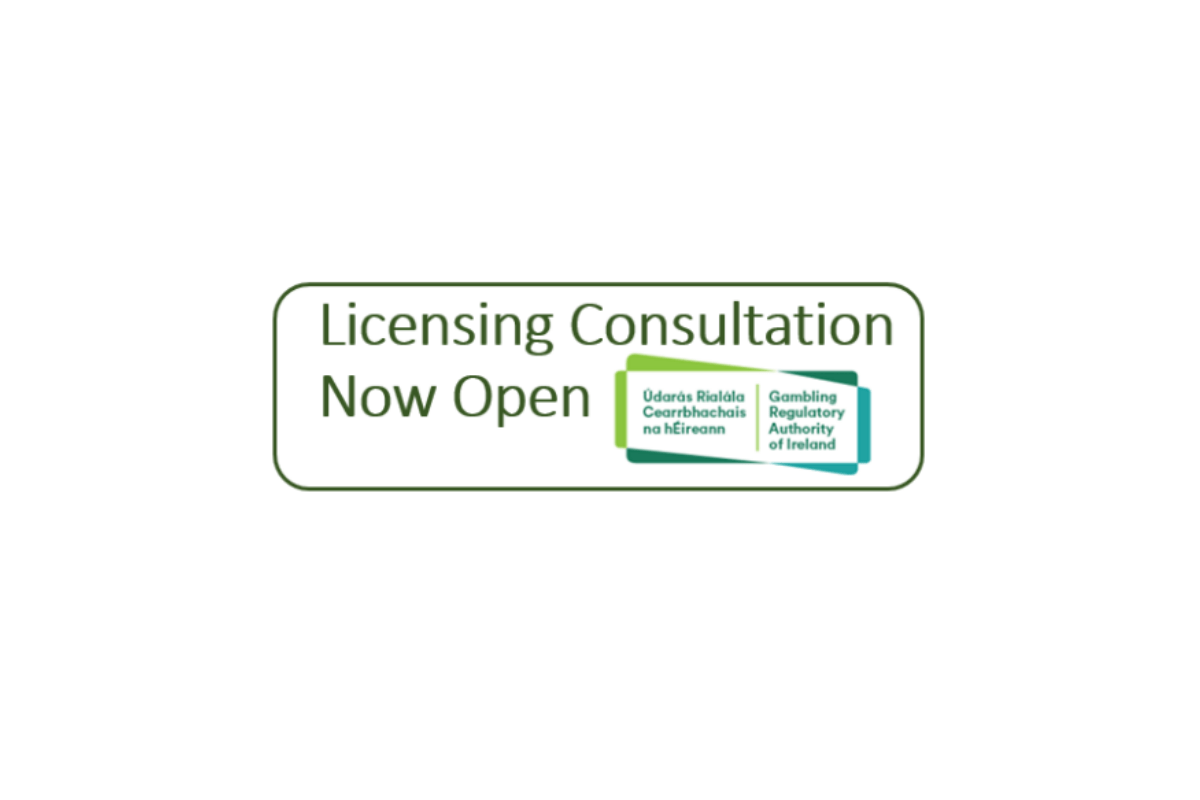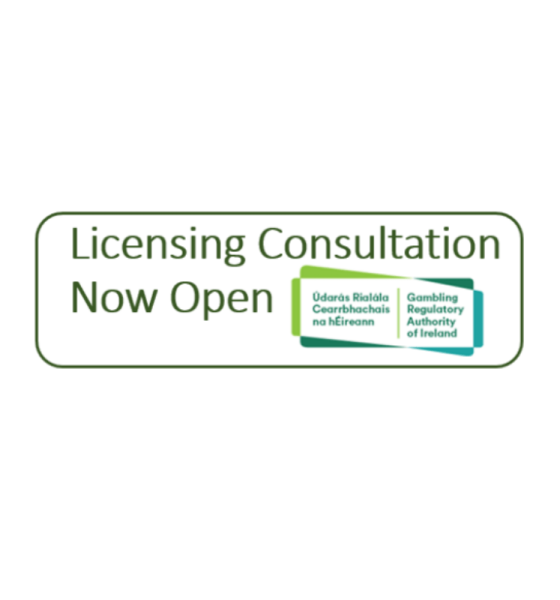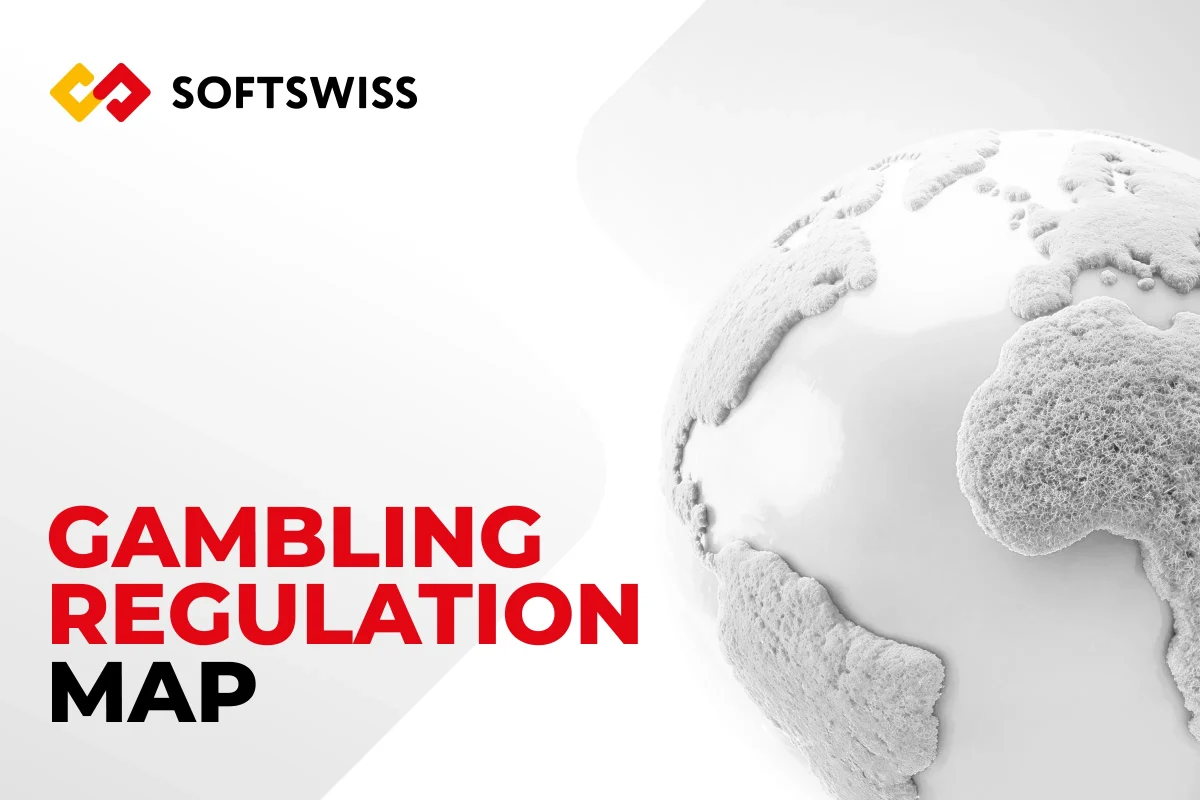

Compliance Updates
GRAI: Join the Ongoing Public Consultation
The GRAI would like to hear the views of stakeholders, including operators and the public on the proposed regulations concerning licensing which will be commenced on a phased basis.
Consultation Published: Monday 7th April 2025
Submission period closes: 5pm on 5th May 2025
About us
We are the Gambling Regulatory Authority of Ireland. We were established on 5 March 2025. Our role is to regulate gambling activities in Ireland.
The law that established us, and sets out what we do, is the Gambling Regulation Act 2024.
Those who wish to provide gambling activities in Ireland will need a licence from us. We can issue different types of gambling licences for in person or remote gambling activities, including the following:
1. Business to consumer gambling licences
This type of licence applies to those providing betting, gaming or lottery activities to consumers.
2. Business to business gambling licences
This type of licence applies to those selling or supplying a gambling product or gambling related service.
3. Licences for a charitable and philanthropic purpose
This type of licence applies to those who wish to provide betting, gaming, or lottery activities for charitable and philanthropic purposes.
We intend to start our licensing function in a phased way, with different licence category types opening at different times.
Our current plan is to first open for Business to Consumer betting licence applications in December 2025 (both in person and remote). This will be followed by opening for gaming licence applications (remote only) towards the end of the first quarter of 2026. However, the order and timing of commencement maybe subject to change. The license application process will take a number of months. Once an application is submitted it will be reviewed to ensure all necessary information and documentation has been submitted. We will then undertake various checks on the applicant and on the Information and documentation submitted to verify the information and to ensure it is given due consideration when making the decision to grant or refuse the license application.
What is the purpose of this consultation?
We have the power to make regulations. Regulations are laws created by Ministers or public bodies under powers given to them by Acts of the Oireachtas.
The first set of regulations we plan to make will:
a. Set the application fee for applications for betting (in person and remote) and gaming (in person and remote) licences. This is provided for in section 38 of the 2024 Act.
The second set of regulations we plan to make will:
b. Set the duration for which a gambling licence remains in force. This is provided for under section 108 of the 2024 Act.
AND
c. Set out some additional conditions which will apply to gambling licences. This is provided for under section 129 of the 2024 Act.
We would like to hear the views of stakeholders, including operators and the public on the proposed regulations.
For more information including how to submit a response please visit: Live Consultation page.
The post GRAI: Join the Ongoing Public Consultation appeared first on European Gaming Industry News.
Amanda Slonzon VP of Compliance and Regulatory Strategy at RubyPlay
RubyPlay’s US Playbook – Turning compliance into a growth engine

After securing entry into its second US state, and with a third firmly in sight, RubyPlay is sharpening its compliance strategy to balance speed with precision. Amanda Slonzon, VP of Compliance and Regulatory Strategy, explains how the company’s US Playbook is helping to turn regulation into a growth engine, from leveraging New Jersey as a benchmark, to preparing for Pennsylvania’s unique challenges, and building trust-based relationships with regulators and partners across the industry.
When people think about compliance in the US iGaming industry, they often imagine it as the handbrake that slows expansion and stifles innovation. For me, it is the opposite as compliance sits in the driver’s seat. It is not simply a support function but a product in itself that enables us to grow faster, enter new markets with confidence and strengthen our relationships across the industry.
The US online casino market is both highly promising and highly fragmented. Only seven states currently regulate iGaming and each has its own framework. Navigating this landscape requires a deep understanding of both the common threads between states and the subtle differences that can make or break a market entry.
This is why we have developed a US Playbook at RubyPlay, which is a detailed, in-house framework for understanding and applying state-by-state requirements in a way that is tailored to our products and infrastructure. With it, our compliance and regulatory specialists break down each regulation, interpret it in the context of our business, and share that knowledge across the company.
Market comparisons
New Jersey will always be the starting point for most operators and suppliers entering the US. It was the pioneer of state-level regulation and, in many ways, still sets the standard for others to follow. Meeting New Jersey’s requirements ensures a company is well-prepared for other states, many of which recognise its certifications. Delaware, for example, places direct reliance on New Jersey approvals, a pragmatic approach that can streamline entry for those already licensed in the Garden state. But even with these efficiencies, each state demands its own level of preparation and adaptation.
Regulators in the US take compliance very seriously and ensure that every technical aspect of a business meets their requirements. Unlike some EU markets, where providers may not need a B2B license, every US state requires B2B licensing through a thorough, state-specific process. While major shifts are rare, when they occur they can significantly impact the industry. Right now, sweepstakes is the most talked-about development, and with New Jersey’s Governor having recently signed the ban into law, we are seeing a wave of prohibition that will have a major impact across the industry. Our role is to remain attentive, follow changes daily, and ensure we stay as compliant as we intend to be.
Every state also has its own technical standards, licensing requirements, tax structures, and approaches to product approval. For example, Pennsylvania applies the highest tax rate on operators in the country yet remains one of the most attractive among operators. It also has a deeply ingrained gaming culture and a large, active player base. Entering a state like Pennsylvania, which is a key target for RubyPlay in 2026, is not just about passing compliance checks but more about understanding the regulator’s expectations, the market’s economic realities and the cultural context of its players.
Fostering close relationships
One of the most important aspects of operating in the US is the strength of relationships with key stakeholders across the entire ecosystem. I have always believed that a strong relationship with the regulator is just as critical as meeting their requirements on paper. We work to ensure that regulators see us as partners who bring solutions, not problems. We communicate openly and demonstrate that we take their rules as seriously as they do. The same process applies to how we work alongside our industry partners. From platform providers or operator customer, we approach every partnership as a collaborative effort to succeed together.
Culture plays a vital role in how we approach regulation. Compliance is considered a technical discipline, but ultimately it is powered by people who care about getting processes and frameworks robust. I am proud to lead a team that is collaborative and solution-oriented. One of my proudest moments recently came during a recruitment process where I was speaking with a candidate for a role within our compliance team. She told me she had been following RubyPlay closely and was so impressed by our company culture, the pride we take in our work and the way we treat our people, that she was willing to relocate to another country just to join the team. It is a real story that speaks to the environment we have built.
Regulation in the US is not going to advance overnight. The state-by-state approach will remain and evolve, and new product categories will emerge that challenge existing frameworks. My perspective is that the companies who thrive will be the ones who embrace this complexity, invest in understanding it deeply, and treat compliance as a strategic asset rather than an operational hurdle.
The US Playbook we have developed is our way of making that happen. It is an ever-evolving strategy that keeps us compliant, competitive and ready for whatever comes next.
The post RubyPlay’s US Playbook – Turning compliance into a growth engine appeared first on Gaming and Gambling Industry in the Americas.
Compliance Updates
SOFTSWISS Releases Gambling Regulation Directory for iGaming Operators

SOFTSWISS, a global tech provider with over 15 years of iGaming expertise, introduces its Gambling Regulation Directory, a new website section designed to help operators navigate the complex landscape of gambling laws worldwide.
The Gambling Regulation Directory provides a structured overview of the legal status of gambling across multiple countries, both land-based and online. With an interactive regulation table and map (coming soon), operators will gain a clear picture of where gambling is permitted, restricted, or prohibited, and evaluate the opportunities, risks, and compliance requirements for entering or expanding into specific markets.
The country profiles also highlight which activities are allowed or prohibited, outline available information on taxation, fees, and licensing terms, and outline key licence details such as duration and permitted activities. In addition, each profile indicates whether SOFTSWISS products are certified or aligned with local regulations, showing operators where SOFTSWISS solutions are ready for use, and underlining our experience and readiness to support them in these markets.
Practical Value for Industry Stakeholders
- Strategic Planning: A trusted reference point for evaluating opportunities and supporting informed decision-making.
- Efficiency: Centralised, up-to-date regulatory information saves time on research.
- Expert Oversight: SOFTSWISS specialists monitor developments to ensure the Directory reflects the latest licensing and legislative changes.
“At SOFTSWISS, we provide a trusted foundation for launching and growing iGaming brands. With the introduction of the Gambling Regulation Directory, we stay true to our goal of offering advanced solutions and empowering operators with the knowledge and insights they need to grow responsibly and sustainably in highly regulated markets. Building on this commitment, our certified software meets the requirements of multiple national regulators, enabling operators to confidently enter new markets with full compliance,” added Olga Resiga, Chief Business Development Officer at SOFTSWISS.
The iGaming Regulation Directory is an evolving resource. Not all country profiles are available yet, but the SOFTSWISS team is committed to updating the Directory regularly with new jurisdictions and the latest regulatory changes.
At SBC Lisbon 2025, Stand B160, visitors will have the opportunity to explore the new Gambling Regulation Directory and exchange views on industry trends with the SOFTSWISS Team.
About SOFTSWISS
SOFTSWISS is an international technology company with over 15 years of experience in developing innovative solutions for the iGaming industry. SOFTSWISS provides comprehensive software for managing iGaming projects. The company’s product portfolio includes the Casino Platform, the Game Aggregator with over 35,000 casino games, Affilka Affiliate Platform, the Sportsbook Platform and the Jackpot Aggregator. The expert team, based in Malta, Poland, and Georgia, counts over 2,000 employees.
The post SOFTSWISS Releases Gambling Regulation Directory for iGaming Operators appeared first on European Gaming Industry News.
Buffey Bourassa
Social Gaming Leadership Alliance: California Tribes Rise Up Against AB 831

Members of Kletsel Dehe Wintun Nation, the Sherwood Valley Rancheria of Pomo Indians, the Mechoopda Indian Tribe of Chico Rancheria and Big Lagoon Rancheria gathered outside the State Capitol in Sacramento to protest Assembly Bill 831 (AB 831).
If passed, the bill would limit economic opportunities available to less wealthy tribes in the state by banning legitimate online social games using sweepstakes promotions. It would also eliminate more than $1 billion of existing economic activity generated by the industry in California, and close off a potential new revenue source for the state via sensible, modern regulation and taxation.
“AB831 is a flawed and rushed bill that lacks broad tribal consensus. As Kletsel Dehe Wintun Nation, the Sherwood Valley Rancheria of Pomo Indians, the Mechoopda Indian Tribe of Chico Rancheria and Big Lagoon Rancheria have made clear, this bill would limit economic options available to tribes and worsen already fragile economic conditions. What California lawmakers should focus on instead is creating proper regulation that supports online social games, creates new revenue sources for the state and protects economic opportunities for all tribes,” said Jeff Duncan, Executive Director of SGLA and former Congressman.
The tribes’ protest focused on the following themes:
• Economic Disparity. Tribes in more geographically isolated areas often lack the scale and resources of wealthy, established gaming tribes. The policies proposed in AB 831 would eliminate digital commerce opportunities for economically disadvantaged tribes to partner with social gaming operators that could provide essential supplemental revenue streams to fund essential services such as healthcare, education, housing, food security, and social programs.
• Lack of Tribal Unity. The increasing number of tribes coming out in opposition to AB 831 highlights the growing divide amongst tribal nations when it comes to the legislation.
• Violation of Tribal Sovereignty. AB 831 contains broad criminalization language that would impose criminal penalties on those who “support directly or indirectly the operation, conduct, or promotion of an online sweepstakes game.” As written, AB 831 also applies to tribal nations. Extending State criminal jurisdiction into Indian Country violates federal law and is an encroachment on tribal sovereignty.
“For communities long overlooked and geographically isolated, digital commerce is not a luxury – it is a lifeline. AB 831 would sever that lifeline. Tribal members gather at the State Capitol today to ask lawmakers to stand for tribal equity, sovereignty, and economic justice by voting NO on AB 831,” said Eric Wright, Tribal Administrator of Kletsel Dehe Wintun Nation and CEO of Kletsel Economic Development Authority, the tribe’s economic development arm.
“We were proud to join with other tribes at the Capitol in Sacramento to tell lawmakers that eliminating legitimate, regulated digital enterprise will only deepen the disparities our people face, erode our tribal self-sufficiency, and contradict California’s stated commitment to equity and inclusion for all tribal nations. We call on California legislators to reject AB 831 and instead advance inclusive policies that support digital innovation, economic diversification, and tribal self-determination. The future of our communities depends on it,” Buffey Bourassa, Secretary of the Sherwood Valley Rancheria of Pomo Indians, said.
“This bill has moved forward without meaningful consultation with our tribes, and it threatens to even further entrench a two-tiered system that benefits wealthy gaming tribes while marginalizing more rural nations like ours. We urge California lawmakers to reject AB 831 and stand firmly for tribal sovereignty, equity, and economic justice,” said Dennis Ramirez, Chairman of the Mechoopda Indian Tribe of Chico Rancheria.
Previously, Kletsel Dehe Wintun Nation, the Sherwood Valley Rancheria of Pomo Indians, the Mechoopda Indian Tribe of Chico Rancheria, and Big Lagoon Rancheria have sent letters to state legislators, including President pro Tempore Senator Mike McGuire and Senate Appropriations Committee Chair Senator Anna Caballero, voicing their opposition against AB 831 and the harm the bill would cause their tribes.
AB 831 was introduced as a last-minute “gut-and-amend” bill in July. The members of these tribal nations and others are urging California lawmakers to reject AB 831 and instead pursue policies that expand economic opportunity, respect tribal sovereignty, and preserve access to popular forms of digital entertainment for all Californians.
The post Social Gaming Leadership Alliance: California Tribes Rise Up Against AB 831 appeared first on Gaming and Gambling Industry in the Americas.
-

 gaming3 years ago
gaming3 years agoODIN by 4Players: Immersive, state-of-the-art in-game audio launches into the next generation of gaming
-
EEG iGaming Directory9 years ago
iSoftBet continues to grow with new release Forest Mania
-
News7 years ago
Softbroke collaborates with Asia Live Tech for the expansion of the service line in the igaming market
-
News7 years ago
Super Bowl LIII: NFL Fans Can Bet on the #1 Sportsbook Review Site Betting-Super-Bowl.com, Providing Free Unbiased and Trusted News, Picks and Predictions
-
iGaming Industry8 years ago
Rick Meitzler appointed to the Indian Gaming Magazine Advisory Board for 2018
-
News7 years ago
REVEALED: Top eSports players set to earn $3.2 million in 2019
-
iGaming Industry8 years ago
French Senator raises Loot Boxes to France’s Gambling Regulator
-
News7 years ago
Exclusive Interview with Miklos Handa (Founder of the email marketing solutions, “MailMike.net”), speaker at Vienna International Gaming Expo 2018















